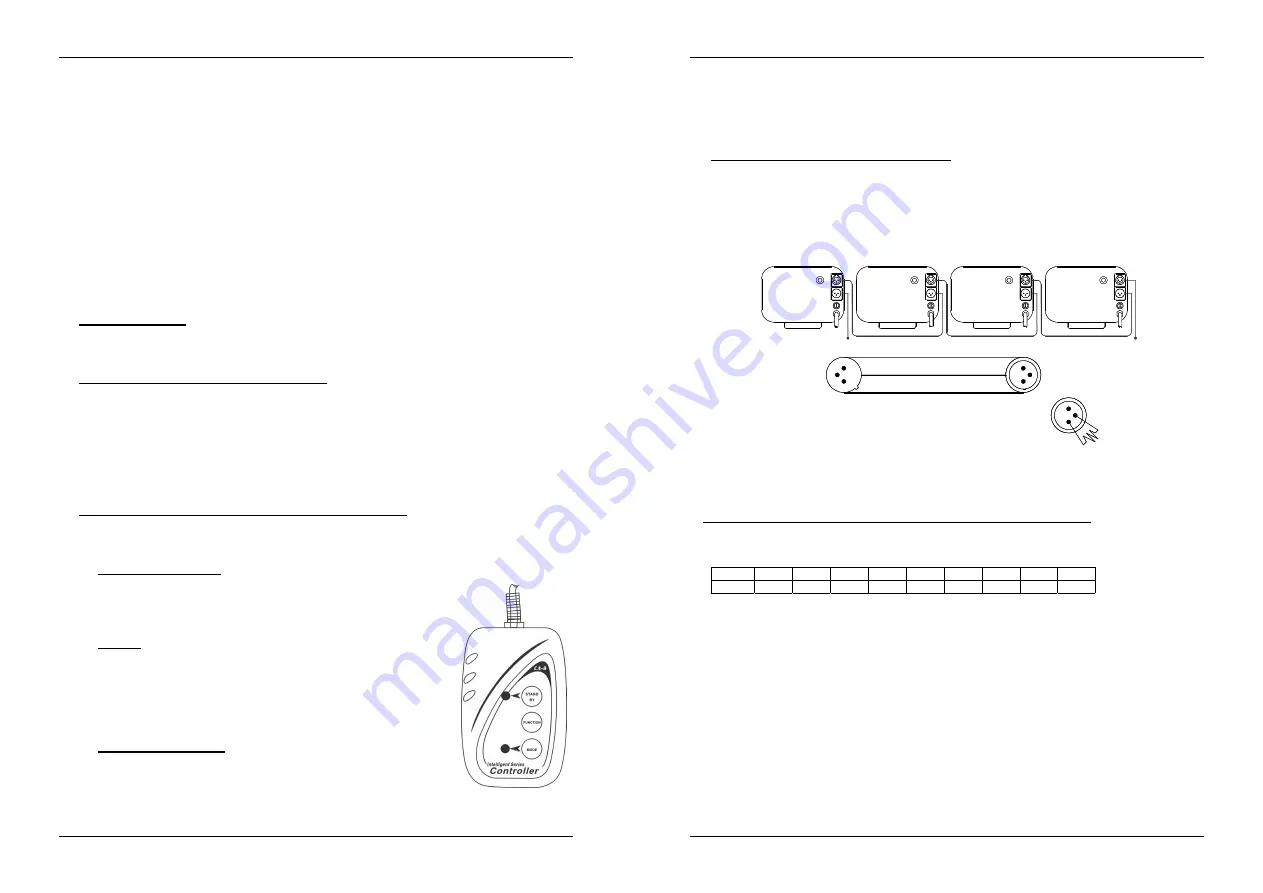
ENGLISH
OPERATION
MANUAL
JB SYSTEMS®
5/48
WINNER2 / ROVER
•
Before rigging make sure that the installation area can hold a minimum point load of
10times the device’s weight.
•
Always use a certified safety cable that can hold 12times the weight of the device when
installing the unit. This secondary safety attachment should be installed in a way that no
part of the installation can drop more than 20cm if the main attachment fails.
•
The device should be well fixed; a free-swinging mounting is dangerous and may not be
considered!
•
Don’t cover any ventilation openings as this may result in overheating.
•
The operator has to make sure that the safety-relating and machine-technical
installations are approved by an expert before using them for the first time. The
installations should be inspected every year by a skilled person to be sure that safety is
still optimal.
CONTROLLING THE WINNER (OR ROVER)
1. Standalone 1unit:
Just connect the unit to the mains and put on some music. The unit will start working
automatically to the rhythm of the music.
2. Two or more units in master/slave setup:
Connect 2 or more units together using good quality balanced XLR microphone cables
(like for example JB Systems code 7-0063). The unit that has no cable connected to its
input will react as master; the others are the slave units.
You don’t have to worry about the settings of the DMX DIP-switches!
It is only
possible to inverse the behavior of a slave unit by changing the position of DIP-switch
n°10. Just try it and see if the effect becomes better. Changing DIP-switch n°10 on the
master has no effect.
3. Connect the optional CA-8 controller for more control:
The CA-8 controller can only be used in standalone or master/slave mode. Connect the
controller to the jack input of the first unit (master). Now you can control all the
connected units:
•
STANDBY BUTTON:
Press this button to start/stop blackout mode on all connected
units. The led is ON when the blackout function is active. After
about 30sec. blackout, the lamp will be switched off
automatically to extend its lifetime.
•
MODE: (fast/slow)
When the led is off, the Winner (or Rover) is in FAST mode.
The beam movements and gobo/color wheel are both sound
activated. Press the button to switch the led on; now the
Winner (or Rover) is in SLOW mode. The beam movements
are sound activated but the gobo/color wheel is static and can
be controlled with the FUNCTION-button.
•
FUNCTION BUTTON: (strobe/next)
Push the FUNCTION button while the Winner (or Rover) is in
FAST mode (MODE led is off) the units will strobe in 3
different ways:
•
Strobe with different gobos/colors
ENGLISH
OPERATION
MANUAL
JB SYSTEMS®
6/48
WINNER2 / ROVER
•
Synchronous strobe in white color
•
Two-light strobe in white color
Every time you push the FUNCTION-button while the Winner (or Rover) is in SLOW
mode (MODE led is on) the colors/gobos of the connected units change.
4. Controlled by universal DMX-controller:
The DMX-protocol is a widely used high speed signal to control intelligent light
equipment. You need to “daisy chain” your DMX controller and all the connected light
effects with a good quality XLR M/F balanced cable (ex. JB Systems ref. 7-0063). To
prevent strange behavior of the light effects, due to interferences, you must use a 90
Ω
to 120
Ω
terminator at the end of the chain. Never use Y-splitter cables, this simply
won’t work!
120 ohm 1/4W
Termination reduces signal errors and to avoid signal
(Resistance 120 ohm 1/4W) between pin2 (DMX-) and
transmission problems and interference. It is always
3
pin3 (DMX+) of the last fixture.
advisable to connect a DMX terminal.
2
DMX -
1
COMMON
DMX +
3
1
DMX512
2
1
2
3
4
DMX INPUT
DMX OUTPUT
2
3
1
Each light effect in the chain needs to have its proper starting address so it knows
which commands from the controller it has to decode.
•
How to set the DIP-switches to obtain the right starting address:
On the back of the Winner (or Rover) you will see that each of the first 9 DIP-switches
corresponds to certain value:
Dip #1 #2 #3 #4 #5 #6 #7 #8 #9
Value
1 2 4 8 16
32 64
128
256
You can combine the values of these switches to become any starting address
between 1 and 512:
Begin address = 01
Æ
switch 1=ON
values: 1
Begin address = 05
Æ
switch 1+3=ON
values: 1+4 = 5
Begin address = 09
Æ
switch 1+4=ON
values: 1+8 = 9
Begin address = 13
Æ
switch 1+3+4=ON
values: 1+4+8 = 13
Begin address = 62
Æ
switch 2+3+4+5+6=ON values: 2+4+8+16+32 = 62






































